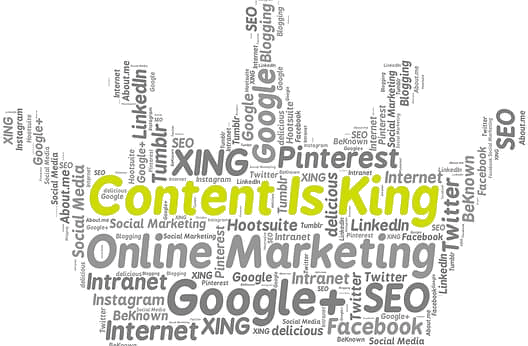

In a classic Homer Simpson moment, he flips through all the TV channels and everything on screen is extremely serious and dull. Homer complains aloud, “What’s wrong with the TV?” He stands, walks over to the set and pounds on it with his fist. “Be Funny!”, he demands of the tube.
That seems to be the problem with Content Maintenance Systems. One assumes that, because you have CMS in place that quality content should magically appear and be immensely relevant and interesting.
Yes, what seems to get lost with the focus on this parsing technology is the content. Not just any content, but any useful content. We’ve all heard of the age-old phrase ‘garbage in, garbage out’. Never more than right now, this applies to many content management solutions.
Why spend money on managing content that no-one understands or needs or finds interesting?
Large organizations are awash with printed manuals sitting on dusty shelves, and hastily written word documents that have lost their purpose and impact almost as soon as they are written. Typically, a CMS is seen as a way of more efficiently publishing this volume of “Stuff” onto the intranet or website.
Great! It does just that. Next question – What does this gain? If the printed manuals were serving their purpose, there would be no need for a CMS. Likewise, most documents written are unreadable, irrelevant quickly, or of little interest. Simply pouring this material into the ‘in tray’ of a CMS decreases organizational efficiency, instead of improving it.

Without content creators, there would be no need for a CMS. Yet surprisingly, this user group is often the worst served by a new content management system.
Most large content management systems provide extensive support for versioning, workflow, job tracking and publishing. Unfortunately, the tools provided for the people composing and inputing the original content is very limited and weak at best.
This is a critical problem. After all, if creating content isn’t easy and efficient, it simply won’t happen. Then the entire situation breaks down. And there is more: The problems with inadequate authoring support tend to grow exponentially as more content is added, going from bad to worse.
However, just a quickly as the problems arise and pile up, there are quick solutions to solve them.
Identify your business needs
What is the CMS actually for? Implementing a content management system is not a business goal in itself, but merely a means to an end.
Don’t take a single step in the project until you have identified what business problems the CMS is meant to solve, and what strategic benefits it will help to achieve. Some simple, practical steps will ensure that you get the best business benefits out of your new CMS from the get go.
Here is a revolutionary way to immediately discover what your staff needs: ask them!
Understand them first, then prove that you are willing to act on their feedback. Result: you will find them an invaluable source for the real information needs of your organization.
Go Back to Square One. Plan to rewrite all of your existing paper manuals. This is a large job (potentially several years of work). It is also the biggest source of productivity and process improvements.

Use professional technical writers and editors, not some college kids you can grab on the cheap. This cannot be overstated: writing well is very hard. When it is poor writing it shows embarrassingly and reflects on you and your entire company. You would not enlist end users to create code; why should you expect them to write polished, effective content?
Masses of material is not the same as a few, well crafted items. In many organizations, users are so overwhelmed by the sheer volume of information available, they are unable to find the single fact they are looking for.
There is a simple solution: give the users less, but better, information. Most of the information on large corporate intranets is absolute junk. Delete or archive it. Don’t make your people slog through it all the time. Distill and summarize the useful information, and present this in a succinct form: a hundred pages can replace a thousand.
How will your users find the one item of information they need? A thousand pages of content are worthless without structure and navigation. A search engine does provide a partial solution, but users require consistency and extensive cross-linking. Engage an information architect and professional indexer to construct a workable structure for your content. Again, don’t go on the cheap for your final product.
Employ a sufficiently rigorous workflow and review process to ensure quality. Remember, there is legal exposure in every page published. This can be achieved through a dedicated authoring team. There are many other benefits in setting up such a structure. If a ‘decentralized’ authoring process is implemented, the challenges of ensuring quality and consistency grow markedly. Ensure workflow and review processes are in place before your CMS goes live. Once errors start to creep into the flow and repository, it is very hard to identify and eliminate them.
Provide all your writers with powerful, yet easy-to-use authoring environments. This should be a definite requirement during the initial product selection phase. Authors should not be required to understand HTML, or any other technical information. The CMS must provide all the tools necessary to manage thousands of pages of content, published to different platforms and formats. In a decentralized authoring approach, a large number of your staff will be using the CMS. This makes ease of use particularly important. Sufficient training will also need to be provided to all users. Authoring support in CMS is often weak, so be prepared to spend extra effort setting this up. Make it easy for authors to help your users.
Computers are actually quite stupid compared to humans. Be wary of salesmen promising absolute and ultimate solutions to content challenges. Examples include automatic classification systems and ‘natural language’ search engines. These are appealing due to their fixed purchase price, and ‘set and forget’ operation. Evaluate these systems against your business needs, and guarantee the results they produce are meaningful and useful.
In the end, the money may instead be spent on a human doing a far better job for far less cost.
Beyond implementation. When a CMS is purchased, there is a short-term activity with clearly defined goals to get it implemented. Then, a permanent process must be put in place to ensure continued accuracy and coverage. The CMS becomes an everyday part of your business’ activities, otherwise it will languish the moment focus shifts. The CMS will then become obsolete and be abandoned within 6-12 months. It has to be continuously maintained and updated.
Creating content is well-understood. Goals are concrete and measurable.
The process of content creation is perfectly suited to standard project management processes, such as design, scoping, deliverables and milestones. If your staff lacks the skills, obtain the services of a contractor or consultant. Remember, a CMS project is in equal parts: technology, content & processes
There are very tangible benefits to be gained by ensuring quality content. These can be defined, tracked and measured.
• Reduce legal accountability, by ensuring information given to customers is consistent and accurate.
• Reduce training costs.
• Improve call centre response times.
• Improve help desk efficiency.
• Eliminate printing and distribution costs.
• Improve staff productivity.
• Support process improvement, by accurately documenting current processes and issues.
A CMS is admirable. Without keeping the focus on the content itself, however, your money will be wasted. To meet business goals and objectives, it is critical to ensure that the information managed by the CMS is what your staff requires.
This is not an impossible goal. By putting in place the right people, resources and processes, you can guarantee that your CMS will meet your business needs.
We will help you with any of your online needs.